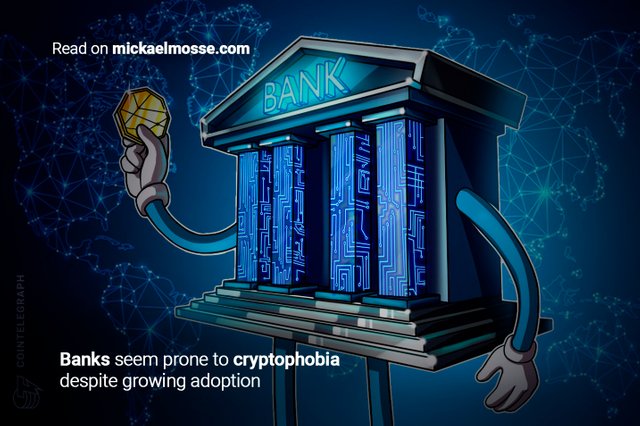Banks seem prone to cryptophobia despite growing adoption.
From refusing to bank crypto trading desks to closing accounts held by platforms, the mainstream financial sector appears to be putting up roadblocks to seamless cryptocurrency commerce. Without banking support, exchanges are often forced to depend on other fiat on-ramps to service the deposit and withdrawal needs of their customers.
The apparent discrimination against crypto exchanges also goes beyond the refusal of banking services. In countries such as South Korea, banks have increased the level of scrutiny involved in renewing operating licenses for platforms. The cost of compliance for these added regulatory provisions has led to several smaller-sized exchanges exiting the country.
These crypto-phobic practices by banks often draw from arguments that cryptocurrencies are a conduit for illegal activities. However, actual investigative data from several sources show that there is hardly any truth to the claim that crypto promotes money laundering and terrorist financing.
Meanwhile, banks continue to be docked for aiding and abetting criminal organizations. From the United States to Australia, commercial banks are paying huge fines for laundering dirty money for syndicates like the mob and violent drug cartels. Yet a more transparent and trustless system is treated as a villain.

We no speak crypto.
In May 2020, JP Morgan accepted its first crypto exchange customers in Coinbase and Gemini. This move came after a rigorous vetting process owing to the massive regulatory moat around banks in the United States when it comes to onboarding startups.
U.S. banks such as JP Morgan were among one of the first fierce critics of Bitcoin (BTC) and cryptocurrencies in general. Thus, it’s unsurprising to see JP Morgan only onboarding its first crypto exchange clients in 2020.
Indeed, major crypto exchanges such as Coinbase and Bitfinex have been known to lose important banking relationships in major markets like Europe, the U.S. and the United Kingdom. Between 2017 and 2018, Bitfinex was forced to pause deposits and withdrawals after several banks, including Wells Fargo, severed ties with the company. Bitfinex even sued Wells Fargo, but the case was later dropped. As previously reported by Cointelegraph, Barclays and Coinbase also parted ways back in August 2019.
In September 2020, crypto exchange Kraken became the first in the U.S. to receive a banking license. As part of its support page, Kraken expressed difficulties in working with some “challenger bank,” stating: “Ironically, most of the issues we’ve seen with funding have been with online-only ‘cloud’ banks. In contrast, traditional banks with physical branches have generally worked fine with our clients.”
Indeed, Kraken lists Monzo and Revolut as cloud banks that do not process deposits or withdrawals from Kraken and other crypto exchanges. Oddly, Revolut began offering crypto support back in 2019, expanding its services to all standard users in April 2020.
Apart from banks not offering services to exchanges, some crypto traders in the U.K. are reportedly unable to withdraw their profits to their bank accounts. Earlier in January, reports emerged that HSBC had barred customers from making deposits and withdrawals using their bank accounts.
Read more on: https://mickaelmosse.com/banks-seem-prone-to-cryptophobia-despite-growing-adoption/